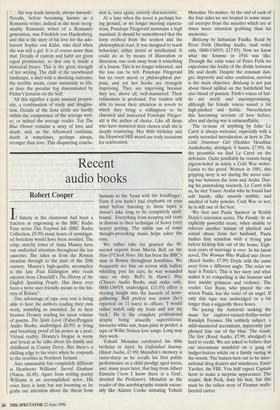Recent audio books
Robert Cooper
If history in the classroom had been a fraction as engrossing as the BBC Radio Four series This Sceptred Isle (BBC Radio Collection, £9.99) many hours of unmitigat- ed boredom would have been avoided. The crisp, starchy tones of Anna Massey have our undivided attention throughout the ten cassettes. She takes us from the Roman invasion through to the start of the 20th century. Massey's high-quality accomplice is the late Paul Eddington who reads extracts from Churchill's The History of the English Speaking People. Has there ever been a more user-friendly means to the his- tory of Britain?
One advantage of tape over text is being able to hear the authors reading their own work; sounding as intended. So to hear Seamus Heaney reading his latest volume of poems, The Spirit Level (Faber/Penguin Audio Books, unabridged £8.99) is living and breathing proof of his power as a poet. Virtual reality. Heaney's brogue is warm and lyrical as he talks about his family and childhood in County Deny. But there's a chilling edge to his voice when he responds to the troubles in Northern Ireland.
Also unmissable but completely different is Heathcote Williams' Sacred Elephant (Naxos, £6.49). Apart from writing poetry Williams is an accomplished actor. His voice here is lusty but not booming as he grabs our attention about the threat from humans to the 'beast with the headfinger'. Even if you hadn't had elephants on your mind before listening to these tapes it doesn't take long to be completely spell- bound. Everything from weeping salt tears in distress to their technique of heavy (very heavy) petting. The subtle use of some thought-provoking music helps sober the tone.
We rather take for granted the 90- second reports from Martin Bell on the Nine O'Clock News. He has been the BBC's man in Bosnia throughout hostilities. We frequently see him on screen with bullets whistling past his ears; he was wounded once on duty. Bell's In Harm's Way (Chivers Audio Books, mail order only, 0800-136919, unabridged, £15.95) offers a riveting insight into the hazards of news- gathering. Bell prefers war zones (he's reported on 11 wars) to offices. 'I would rather watch only my front and not my back.' He is the complete professional despite being absurdly superstitious; favourite white suit, brass pixie in pocket, a tape of Willie Nelson love songs. Long may they work.
Yehudi Menuhin celebrated his 80th birthday in April. In Unfinished Journey (Reed Audio, £7.99) Menuhin's memory is razor-sharp as he recalls his first public performance as a child prodigy aged seven, and, many years later, that hug from Albert Einstein (`now I know there is a God', drooled the Professor). Menuhin as the reader of this autobiography sounds uncan- nily like Alistair Cooke imitating Yehudi Menuhin. No matter. At the end of each of the four sides we are treated to some musi- cal excerpts from the maestro which are at times more attention grabbing than his memories.
Birdsong by Sebastian Faulks. Read by Peter Firth (Sterling Audio, mail order only, 0800-136919, £17.95). Now we know what the Somme in 1916 was like. Through the calm voice of Peter Firth we experience the frailty of the divide between life and death. Despite the constant dan- ger, depravity and utter confusion, survival is the main objective. Birdsong is not just about blood spilled on the battlefield but also blood of passion. Firth's voices of bat- tle are steely and uncompromising, although his female voices sound a bit high-pitched and feeble. Nevertheless this harrowing account of love before, after and during war is unturnoffable.
The re-issue of anything by John Le Cane is always welcome, especially with a newly recorded introduction, as here in The Little Drummer Girl (Hodder Headline Audiobooks, abridged, 6 hours, £7.99). In the preamble we find Le Cane on the defensive. Quite justifiably he resents being pigeon-holed as solely a Cold War writer. Listen to the proof. Written in 1981, this gripping story is set during the never end- ing war between the Jews and Arabs. Dur- ing his painstaking research, Le Cane tells us, he met Yasser Arafat who he found had soft hands, silky smooth stubble, and smelled of baby powder. Cold War or not, he is still one of the best.
We first met Paula Spencer in Roddy Doyle's television series, The Family. In an explicitly powerful scene, when unable to tolerate another instant of physical and sexual abuse from her husband, Paula bashes him senseless with a frying pan before kicking him out of the house. Eigh- teen years of marriage is over. In his latest novel, The Woman Who Walked into Doors (Reed Audio, £7.99) Doyle tells the same story from a different angle. The voice we hear is Paula's. This is her story and what makes it so compelling is the humour and love amidst grimness and violence. The reader, Ger Ryan, who played the on- screen Paula, has the voice of an angel. If only this tape was unabridged or a bit longer than a niggardly three hours.
No pacing the Antarctic seeking the muse for explorer-turned-thriller-writer Ranulph Fiennes. His unlikely subject, a mild-mannered accountant, apparently just phoned him out of the blue. The result, The Sett (Reed Audio, £7.99, abridged) is hard to credit. We are asked to believe that our accountant stumbled on a gang of badger-baiters whilst on a family outing in the woods. The baiters turn out to be inter- national drug dealers and murderers. Enter Yardies, the FBI. You half expect Captain Scott to make a surprise appearance. The reader, Bob Peck, does his best, but this must be the tallest story of Fiennes multi- faceted career.


























































 Previous page
Previous page